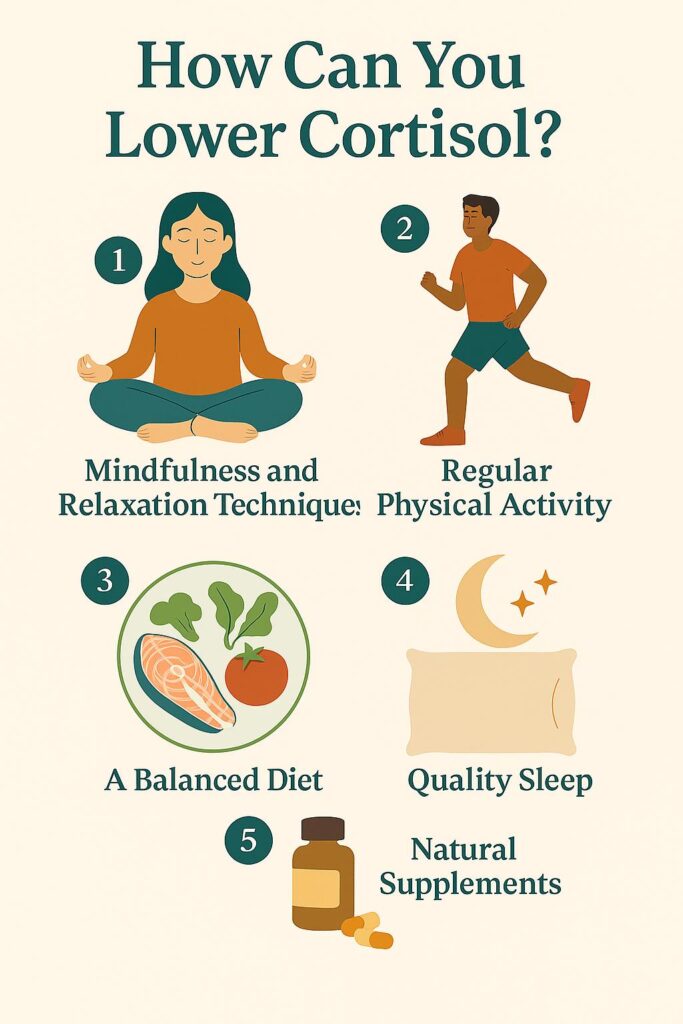In today’s fast-paced world, stress is often an unwelcome companion. Many people experience the effects of high cortisol levels, which can lead to anxiety, weight gain, and disrupted sleep. Understanding how to manage these levels is crucial for overall well-being.
The Role of Cortisol in Our Lives
Cortisol, often referred to as the “stress hormone,” is produced by the adrenal glands in response to stress. While it plays a vital role in helping us react to challenges, chronic high levels can lead to numerous health issues. This is where the need to understand how to lower cortisol comes into play.
High cortisol levels can contribute to various problems, such as:
- Emotional Distress: Increased anxiety and mood swings.
- Physical Health Issues: Weight gain, high blood pressure, and weakened immune function.
- Sleep Disruptions: Difficulty falling or staying asleep, leading to fatigue.
Recognising these effects, many are seeking effective ways to reduce cortisol levels and promote a sense of calm.
How Can You Lower Cortisol?
There are several strategies to help manage cortisol effectively:
1. Mindfulness and Relaxation Techniques
Practices like meditation, deep breathing, and yoga can significantly reduce stress and lower cortisol levels. Taking just a few minutes each day to focus on your breath or engage in mindfulness can create a sense of peace.
2. Regular Physical Activity
Exercise is a powerful tool for managing stress. Engaging in regular physical activity helps release endorphins, which improve mood and combat stress. Aim for at least 30 minutes of exercise most days to keep cortisol in check.
3. A Balanced Diet
What you eat can influence your stress levels. Consuming a diet rich in fruits, vegetables, whole grains, and lean proteins can help maintain healthy cortisol levels. On the other hand, excessive sugar and caffeine can spike cortisol, so it’s best to limit these.
4. Quality Sleep
Sleep is essential for hormonal balance. Strive for 7-9 hours of restful sleep each night. Establishing a calming bedtime routine can help improve sleep quality and, in turn, regulate cortisol levels.
5. Natural Supplements
Natural remedies can also play a significant role in managing cortisol. This is where Ashwagandha comes into the spotlight.

Discovering Ashwagandha
Ashwagandha is an adaptogenic herb used in traditional Ayurvedic medicine for centuries. It helps the body adapt to stress and promotes overall balance. Research suggests that Ashwagandha can effectively lower cortisol levels, making it a popular choice for those seeking relief from stress.
One natural solution gaining popularity is Ashwagandha, an ancient herb known for its calming properties. This article explores the connection between Ashwagandha and cortisol, highlighting an excellent product that can help you on your journey to balance: Ashwagandha Calm Complex Gummies.
How Ashwagandha Works
The herb’s calming properties support the body’s stress response, helping to regulate cortisol. This is particularly beneficial for anyone dealing with chronic stress or anxiety. Many users report feeling more relaxed and focused after incorporating Ashwagandha into their daily routine.
Why Choose Ashwagandha Calm Complex Gummies?
For those looking to enjoy the benefits of Ashwagandha in a convenient and tasty form, Ashwagandha Calm Complex Gummies are an excellent option. Here’s why:
- Delicious Taste: With a delightful mango flavour, these gummies make taking supplements enjoyable rather than a chore.
- Natural Properties: They combine Ashwagandha with other calming herbs like lemon balm, chamomile, and lavender, designed to promote emotional balance and stress relief.
- Easy to Use: Simply take two gummies a day to support your well-being, making them a perfect fit for busy lifestyles.
- Vegan and Gluten-Free: Suitable for various dietary preferences, these gummies ensure that everyone can benefit from their calming effects.

Incorporating Ashwagandha Gummies into Your Life
Adding Ashwagandha gummies to your daily routine can be simple. Here are some tips:
- Morning Boost: Start your day with a gummy to set a positive tone for the day ahead.
- Post-Workout Recovery: Enjoy a gummy after exercising to help relax and recover.
- Evening Relaxation: Take your gummies before bedtime to promote a restful night’s sleep.

Achieving Balance with Ashwagandha
Managing cortisol levels is vital for maintaining both emotional and physical health. By incorporating strategies like mindfulness, exercise, and a healthy diet, alongside natural supplements like Ashwagandha, you can create a balanced and fulfilling life.
If you’re ready to take control of your stress and support your well-being, consider trying Ashwagandha Calm Complex Gummies. They offer a simple, delicious way to enjoy the benefits of this powerful herb.
Don’t let stress dictate your life—embrace the calming power of Ashwagandha and discover a more balanced you!
Please Note:
The information provided in this article is for educational purposes only and is not intended as medical advice. Always consult with a healthcare professional before starting any new supplement, especially if you are pregnant, breastfeeding, have existing health conditions, or are taking medication. Individual results may vary, and it is important to discuss any concerns or questions about your health with a qualified medical provider. Those who are deficient may experience the greatest benefit from this supplement.
Source:
NHS – Breathing exercises for stress, anxiety and panic
https://www.nhs.uk/mental-health/self-help/guides-tools-and-activities/breathing-exercises-for-stress/
British Dietetic Association (BDA) – Food and Mood Fact Sheet
https://www.bda.uk.com/resource/food-facts-food-and-mood.html
NHS – How to get to sleep
https://www.nhs.uk/every-mind-matters/mental-health-issues/sleep/
UK Government – Loneliness and cortisol dysregulation (evidence review):
https://www.gov.uk/government/publications/tackling-loneliness-evidence-review/tackling-loneliness-evidence-review-summary-report

